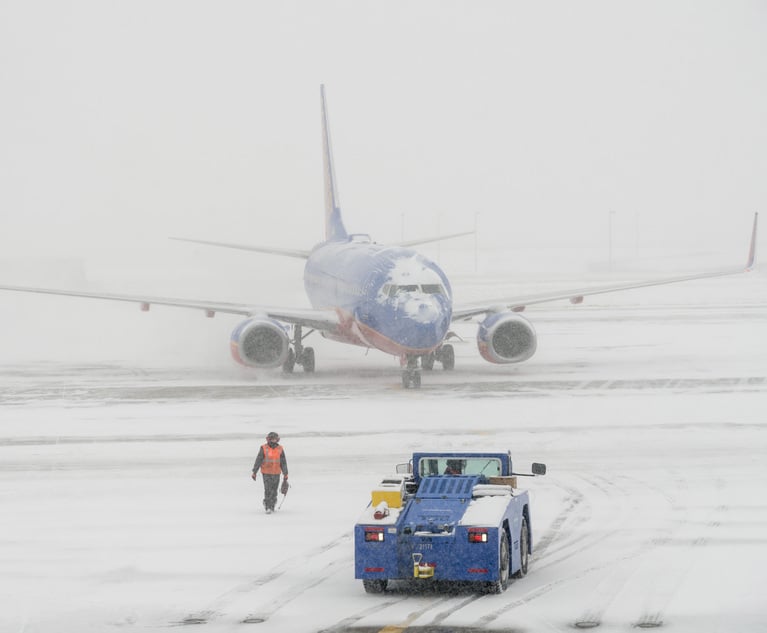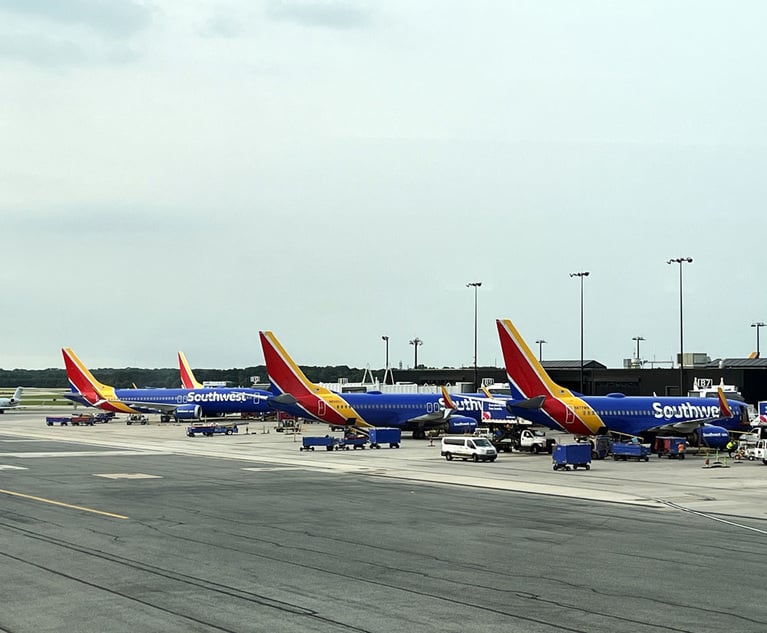 Brightline train crosses on track between Fillmore St. and Polk St. where the city of Hollywood, Florida, is planning to build a train station. Photo: J. Albert Diaz/ALM
Brightline train crosses on track between Fillmore St. and Polk St. where the city of Hollywood, Florida, is planning to build a train station. Photo: J. Albert Diaz/ALM A Rail Strike Looms; Impact on US Economy Could Be Broad
One of the biggest rail unions rejected its deal Monday, joining three others that have failed to approve contracts over concerns about demanding schedules and the lack of paid sick time. That raises the risk of a strike, which could start as soon as Dec. 5.
November 22, 2022 at 11:56 AM
7 minute read
American consumers and nearly every industry will be affected if freight trains grind to a halt next month.
One of the biggest rail unions rejected its deal Monday, joining three others that have failed to approve contracts over concerns about demanding schedules and the lack of paid sick time. That raises the risk of a strike, which could start as soon as Dec. 5.
It wouldn't take long for the effects of a rail strike to trickle through the economy. Many businesses only have a few days' worth of raw materials and space for finished goods. Makers of food, fuel, cars and chemicals would all feel the squeeze, as would their customers.
That's not to mention the commuters who would be left stranded because many passenger railroads use tracks owned by the freight railroads.
The stakes are so high for the economy that Congress is expected to intervene and impose contract terms on railroad workers. The last time US railroads went on strike was in 1992. That strike lasted two days before Congress intervened. An extended rail shutdown has not happened for a century, partly because a law passed in 1926 that governs rail negotiations made it much harder for workers to strike.
Here are some of the expected impacts of a rail strike:
$2 Billion a Day
Railroads haul about 40% of the nation's freight each year. The railroads estimated that a rail strike would cost the economy $2 billion a day in a report issued earlier this fall. Another recent report put together by a chemical industry trade group projected that if a strike drags on for a month some 700,000 jobs would be lost as manufacturers who rely on railroads shut down, prices of nearly everything would increase even more and the economy could be thrust into a recession.
And although some businesses would try to shift shipments over to trucks, there aren't nearly enough of them available. The Association of American Railroads trade group estimated that 467,000 additional trucks a day would be needed to handle everything railroads deliver.
Chemicals Run Dry
Chemical manufacturers and refineries will be some of the first businesses affected, because railroads will stop shipping hazardous chemicals about a week before the strike deadline to ensure that no tank cars filled with dangerous liquids wind up stranded.
Jeff Sloan with the American Chemistry Council trade group said chemical plants could be close to shutting down by the time a rail strike actually begins because of that.
That means the chlorine that water treatment plants rely on to purify water, which they might only have about a week's supply of on hand, would become hard to get. It would be hard for manufacturers to make anything out of plastic without the chemicals that are part of the formula. Consumers will also pay more for gasoline if refineries shut down either because they can't get the ingredients they need to make fuel or because railroads aren't available to haul away byproducts like sulfur.
Chemical plants also produce carbon dioxide as a byproduct, so the supply of carbon dioxide that beverage makers use to carbonate soda and beer would also be restricted, even though the gas typically moves via pipelines.
Passenger Problems
Roughly half of all commuter rail systems rely at least in part on tracks that are owned by freight railroads, and nearly all of Amtrak's long-distance trains run over the freight network.
Back in September, Amtrak cancelled all of its long-distance trains days ahead of the strike deadline to ensure passengers wouldn't be left stranded in remote parts of the country while still en route to their destination.
And major commuter rail services in Chicago, Minneapolis, Maryland and Washington state all warned then that some of their operations would be suspended in the event of a rail strike.
Food Fears
It would take about a week for customers to notice shortages of things like cereal, peanut butter and beer at the grocery store, said Tom Madrecki, vice president of supply chain for the Consumer Brands Association.
About 30% of all packaged food in the U.S. is moved by rail, he said. That percentage is much higher for denser, heavier items like cans of soup.
Some products, like cereal, cooking oils and beer, have entire operations built around rail deliveries of raw ingredients like grain, barley and peanuts, along with shipments of finished products.
Those companies typically keep only two to four days' worth of raw ingredients on hand because it's expensive to store them, Madrecki said, and grocers also keep a limited supply of products on hand.
Madrecki said big food companies don't like to discuss the threat of a rail strike because of worries about product shortages can lead to panic buying.
Hungry Herds
Any disruption in rail service could threaten the health of chickens and pigs, which depend on trains to deliver their feed, and contribute to higher meat prices.
"Our members rely on about 27 million bushels of corn and 11 million bushels of soybean meal every week to feed their chickens. Much of that is moved by rail," said Tom Super, a spokesman for the National Chicken Council, a trade group for the industry raising chickens for meat.
The National Grain and Feed Association said a rail strike now would hit pork and chicken producers in the southern U.S. hardest, because their local supply of corn and soybeans from this year's harvest is likely exhausted and they'd have to ship feed by truck, dramatically increasing costs.
"They only have so much storage. They can't go without rail service for too long before they'd have to shut down the feed mills and they run into problems," said Max Fisher, the NGFA's chief economist.
Retail Risks
Jess Dankert, the vice president for supply chain at the Retail Industry Leaders Association, said retailers' inventory is largely in place for the holidays. But the industry is developing contingency plans.
"We don't see, you know, canceling Christmas and that kind of narrative," Dankert said. "But I think we will see the generalized disruption of really anything that moves by rail."
David Garfield, a managing director with the consulting firm AlixPartners, said a rail strike could still impact holiday items shipped to stores later in December, and would definitely hamper stocking of next season's goods.
Retailers are also concerned about online orders. Shippers like FedEx and UPS use rail cars that hold roughly 2,000 packages in each car.
Automobile Angst
Drivers are already paying record prices and often waiting months for new vehicles because of the production problems in the auto industry related to the shortage of computer chips in recent years.
That would only get worse if there is a rail strike, because roughly 75% of all new vehicles begin their journey from factories to dealerships on the railroad. Trains deliver some 2,000 carloads a day filled with vehicles.
And automakers may have a hard time keeping their plants running during a strike because some larger parts and raw materials are transported by rail.
Associated Press writers David Pitt in Des Moines, Iowa, and Dee-Ann Durbin in Detroit contributed to this report.
Josh Funk reports for The Associated Press.
NOT FOR REPRINT
© 2025 ALM Global, LLC, All Rights Reserved. Request academic re-use from www.copyright.com. All other uses, submit a request to [email protected]. For more information visit Asset & Logo Licensing.
You Might Like
View All
Southwest Airlines Faces $100M Class Action Over Pay Periods

Rogge Dunn Represents Florida Trucking Firm in Civil RICO Suit Against Worldwide Express
4 minute read
Fowler White Burnett Opens Jacksonville Office Focused on Transportation Practice
3 minute readTrending Stories
- 15th Circuit Considers Challenge to Louisiana's Ten Commandments Law
- 2Crocs Accused of Padding Revenue With Channel-Stuffing HEYDUDE Shoes
- 3E-discovery Practitioners Are Racing to Adapt to Social Media’s Evolving Landscape
- 4The Law Firm Disrupted: For Office Policies, Big Law Has Its Ear to the Market, Not to Trump
- 5FTC Finalizes Child Online Privacy Rule Updates, But Ferguson Eyes Further Changes
Who Got The Work
J. Brugh Lower of Gibbons has entered an appearance for industrial equipment supplier Devco Corporation in a pending trademark infringement lawsuit. The suit, accusing the defendant of selling knock-off Graco products, was filed Dec. 18 in New Jersey District Court by Rivkin Radler on behalf of Graco Inc. and Graco Minnesota. The case, assigned to U.S. District Judge Zahid N. Quraishi, is 3:24-cv-11294, Graco Inc. et al v. Devco Corporation.
Who Got The Work
Rebecca Maller-Stein and Kent A. Yalowitz of Arnold & Porter Kaye Scholer have entered their appearances for Hanaco Venture Capital and its executives, Lior Prosor and David Frankel, in a pending securities lawsuit. The action, filed on Dec. 24 in New York Southern District Court by Zell, Aron & Co. on behalf of Goldeneye Advisors, accuses the defendants of negligently and fraudulently managing the plaintiff's $1 million investment. The case, assigned to U.S. District Judge Vernon S. Broderick, is 1:24-cv-09918, Goldeneye Advisors, LLC v. Hanaco Venture Capital, Ltd. et al.
Who Got The Work
Attorneys from A&O Shearman has stepped in as defense counsel for Toronto-Dominion Bank and other defendants in a pending securities class action. The suit, filed Dec. 11 in New York Southern District Court by Bleichmar Fonti & Auld, accuses the defendants of concealing the bank's 'pervasive' deficiencies in regards to its compliance with the Bank Secrecy Act and the quality of its anti-money laundering controls. The case, assigned to U.S. District Judge Arun Subramanian, is 1:24-cv-09445, Gonzalez v. The Toronto-Dominion Bank et al.
Who Got The Work
Crown Castle International, a Pennsylvania company providing shared communications infrastructure, has turned to Luke D. Wolf of Gordon Rees Scully Mansukhani to fend off a pending breach-of-contract lawsuit. The court action, filed Nov. 25 in Michigan Eastern District Court by Hooper Hathaway PC on behalf of The Town Residences LLC, accuses Crown Castle of failing to transfer approximately $30,000 in utility payments from T-Mobile in breach of a roof-top lease and assignment agreement. The case, assigned to U.S. District Judge Susan K. Declercq, is 2:24-cv-13131, The Town Residences LLC v. T-Mobile US, Inc. et al.
Who Got The Work
Wilfred P. Coronato and Daniel M. Schwartz of McCarter & English have stepped in as defense counsel to Electrolux Home Products Inc. in a pending product liability lawsuit. The court action, filed Nov. 26 in New York Eastern District Court by Poulos Lopiccolo PC and Nagel Rice LLP on behalf of David Stern, alleges that the defendant's refrigerators’ drawers and shelving repeatedly break and fall apart within months after purchase. The case, assigned to U.S. District Judge Joan M. Azrack, is 2:24-cv-08204, Stern v. Electrolux Home Products, Inc.
Featured Firms
Law Offices of Gary Martin Hays & Associates, P.C.
(470) 294-1674
Law Offices of Mark E. Salomone
(857) 444-6468
Smith & Hassler
(713) 739-1250







